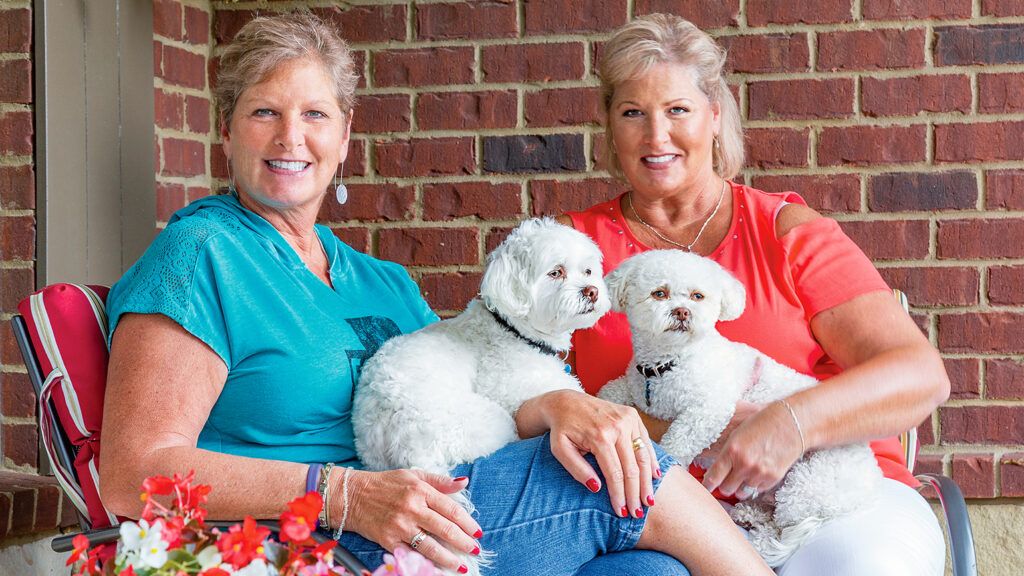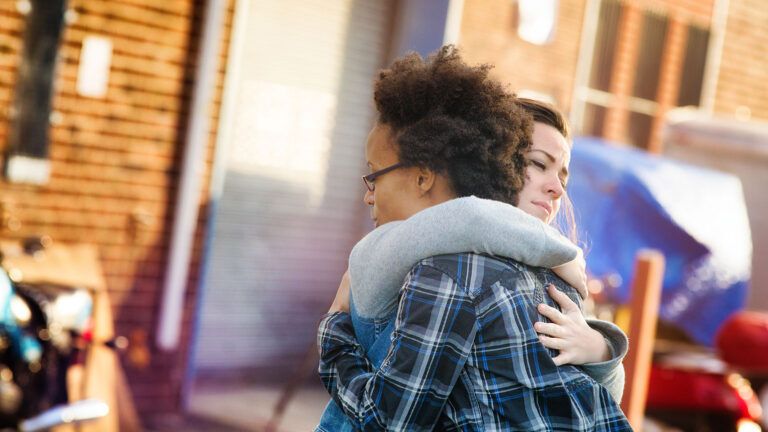“How about some lunch?” I said to my twin sister, Karen. I headed into the kitchen. Pad, pad, pad. Karen was right behind me, as always.
“What can I do?” she asked, looking puzzled.
I cast around for an easy job. “You can spread the mayonnaise,” I said, handing her a jar and a knife. Karen looked at them blankly. I showed her how to dip the knife in the jar and spread the mayonnaise on a slice of bread. With me guiding her hand, she could do it. When I went back to slicing cheese, she stopped and stared at the knife.
I wanted to cry. Karen was 50 years old. For most of those years, she had been my rock and my closest companion. From the time we were kids, knowing each other’s thoughts without speaking, we shared a deep, unbreakable bond. Even after we grew up, got married and weathered the ups and downs of adulthood, we were always there for each another.
Karen was my support when my first marriage broke up. My cheerleader when I went back to work after raising kids. My sounding board when I remarried and learned to live in a blended family. She was always there and always would be. Or so I’d thought.
Karen had been diagnosed two years earlier with early-onset Alzheimer’s. This year she and her husband, Lance, had moved from Indiana to Georgia, where our two families bought neighboring houses so I could care for Karen. I’d quit my job as an assistant in a doctor’s office and devoted myself to helping Karen through daily life. Each morning, Lance walked Karen over to my house on his way to work. I was with Karen all day until Lance got home.
Bible Verses for Alzheimer’s Caregivers |
It had been only a few months, but I was already wondering whether I was up to the job. I loved my twin so much, I’d assumed caring for her would come naturally. I was wrong. Karen needed so much help with so many things. And it was precisely because I loved her that it hurt to see her so diminished.
That pain, the pain of slowly losing my sister, made it hard to think objectively. If I couldn’t even show her how to make a sandwich, how was I ever going to help Karen cope with the long-term consequences of her Alzheimer’s? Her loss of self?
We’d all been blindsided by her diagnosis. Of the two of us, she seemed the least likely to lose her mental sharpness. Karen was always put together, always on top of things. I’m a jeans-and-sweatshirt girl, happiest when things are casual and unplanned. Karen loved dressing up, and she was masterful at organizing social events. My first inkling something was wrong was when she totally dropped the ball organizing a party for her younger son’s high school graduation.
“Maybe we’ll order some sandwiches or something?” she replied distractedly when my family arrived early for the graduation and asked about the celebration. Friends from her church ended up throwing something together at the last minute. Karen didn’t even seem fazed. It was as if she didn’t grasp what had happened.
More and more she forgot things. Got lost running errands. Repeated herself on the phone. One day she called in tears to say she’d lost her job in a medical office because she’d been double-billing patients. Lance’s stepmom, a dentist, hired her to work in her office, but Karen kept forgetting how to do tasks she’d been taught just the day before.
She resisted going to the doctor. “I’m not stupid, just a little forgetful,” she would say. But eventually she relented, went to see a neurologist and began a round of memory tests and blood screens.
I had been flying to Indiana from Georgia to accompany her to appointments. Flying home after the doctor told her she had dementia, I cried and poured out my anger at God. The intensity of my anger shocked me. I called a friend from church who’d recovered from breast cancer and asked if she too had gotten mad at God.
“Of course!” she said. “But then I realized how stupid it was to say, ‘Why me?’ I mean, why not me? I’m not so special. I stopped being mad and just asked God to help me get through it.”
I wanted to do that. It was hard enough when I was seeing Karen every few weeks, while she and Lance had still lived in Indiana. Now that I was with her every day, I kept finding new reasons to grieve or feel frustrated or inadequate.
I hated seeing my sharp-witted sister befuddled by everyday tasks such as putting on a shirt or spreading mayonnaise. She’d always been the competent one! I used to call her for recipe advice, clothes advice, just to hear her voice and her hilarious stories about her two boys, now grown up and living on their own. All of that was gone now.
“You’ll never regret this time with her,” my husband, Rick, had said when we talked and prayed about my becoming Karen’s caregiver. He was right. I didn’t regret it. But I didn’t know how long I could keep it up. It was hard just getting Karen into a car to go to appointments. I had to walk her through everything. And when I wasn’t with her, engaging her, she often just sat, staring straight ahead.
“What are you thinking, Sissy?” I’d ask her. “Nothing,” she’d say with a tentative smile, as if hoping that was the correct response.
The evening after our not-so-successful lunch, I couldn’t sleep. I felt overwhelmed. That day had been especially hard. Karen had been confused by everything, and at one point she simply started crying. I couldn’t console her, couldn’t soothe the tears away. I just held her, wondering, yet again, how God could allow this to happen to my sister.
Now, in bed, I asked for some sign that I was meant to care for Karen. Give me the strength to do this, I pleaded. Don’t abandon me.
I remembered all the times Karen had been strong for me. Like the day in high school she gave me the courage to sing in front of my class for a music test, and I passed. Or the time I phoned her in a panic from the stairwell at a temp job, after I’d started working again following my divorce.
“I can’t do this,” I managed to say.
“Yes, you can,” Karen said. “And you will. Go back in there and do your best, and I’ll talk to you tonight.” I went back to my desk, counting on that phone call.
Well, Karen was counting on me now. God did not answer my question about why she got Alzheimer’s. And no voice told me I was strong enough to do the job. But I did drift off to sleep. When I awoke, I felt a profound peace. In that moment free from fear, my mind cleared and I realized I didn’t have to do this alone.
Lance had mentioned a blog he’d been following by a woman whose husband had Alzheimer’s. I looked it up and found a link to an online Alzheimer’s support group. I was amazed. The stories sounded so much like mine! Same challenges. Same frustrations. Same pain and grief and guilt. If those people could do it, couldn’t I? I wasn’t alone!
My brother’s wife worked in a retirement home, but before then, I remembered, she had done in-home care visits. Some of those clients had Alzheimer’s. I called her.
“I’m so glad you called!” she said. “I’ve wanted to help, but I didn’t want to intrude. I have a lot of suggestions for you. There are even things you can do to help slow Karen’s memory loss.”
She sent over a care package filled with puzzles and games designed to exercise Karen’s mind. And she gave me practical tips for understanding Karen’s limits and not letting them get to me.
Rick’s mom, who lives in Nebraska, called and asked if she could come stay with us for part of the winter. “Obviously I want that southern warmth,” she said. “But I want to help with Karen too.”
She was invaluable. Getting Karen into the car was so much easier with two of us. Everything was easier. Rick’s mom was gentle and patient. “It gives me a chance to be a mom again,” she said. “Just you wait. When you get to my age, you’ll miss it too.”
I signed Karen and me up for a comfort blanket ministry at church. Karen couldn’t sew the fabric edges to finish off the blankets, but she liked being with the other women. They gave her lots of attention and put her in charge of collecting scrap material and bagging it up, a job she seemed able to handle. She laughed whenever someone told a joke, or said “Aw” after a sad story. The interaction with other people was good for her.
Back home one afternoon after the blanket ministry meet-up, Karen and I sat in the living room working on one of my sister-in-law’s cognition puzzles: four large pieces made out of an old family photo of Karen, Lance, our brother and his wife. The pieces, backed by flexible magnetic material, fit onto a cookie sheet my sister-in-law had decorated with rhinestones and a shiny letter K, for Karen.
“See if you can put this together,” I said to Karen, showing her the pieces.
“Is that right?” Karen asked on her first try.
“Not quite,” I said. “Keep going.”
Karen got three pieces to fit and held the fourth, turning it around to figure out which way to place it. In that moment, I knew we would be okay. Yes, the Karen I knew and loved would never come back. We would lose a little more of her each year. But it was a puzzle we all could put together. I was not alone. I could learn how to do this. God was with us.
“Is this right?” Karen asked, fitting the last piece.
“Perfect,” I said.
Karen’s face lit up. I reached over and hugged her. My twin sister and me. Always there for each other.





